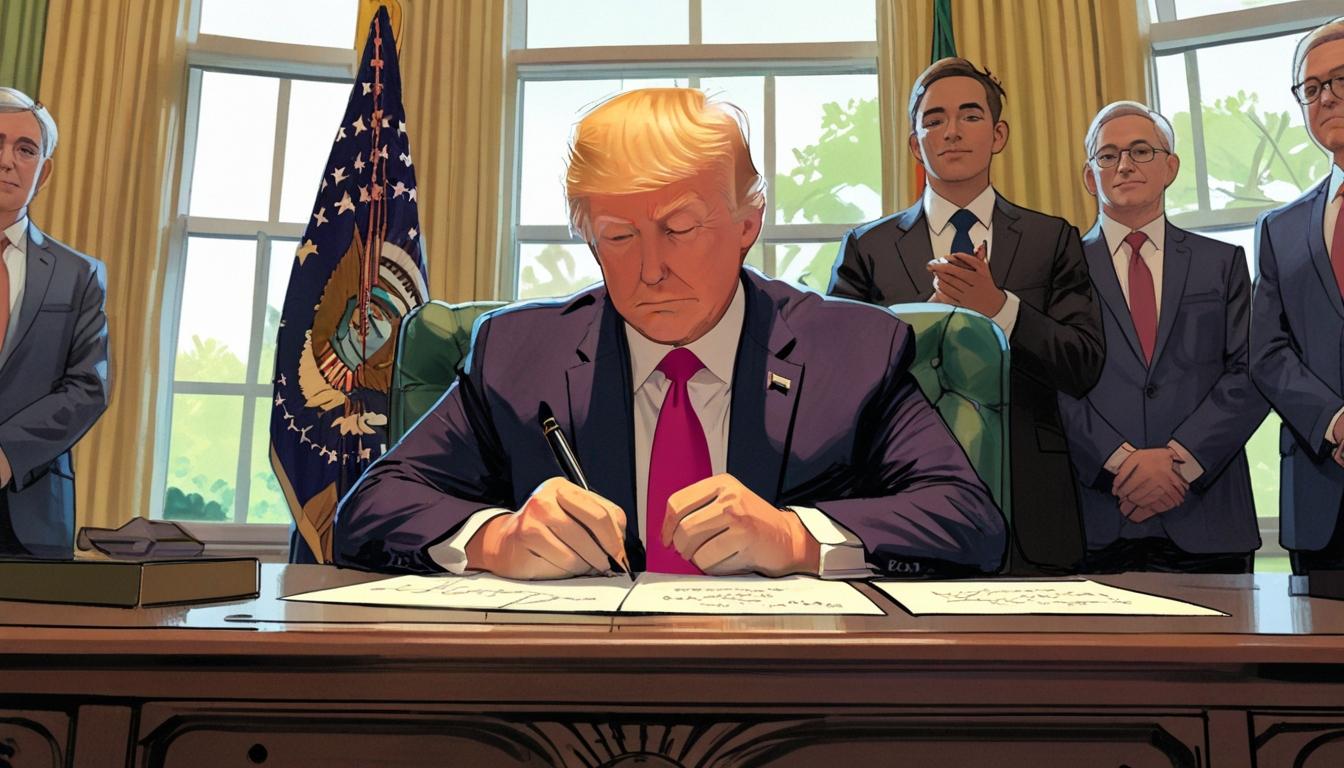President Donald Trump has signed a series of executive orders aimed at reforming college accreditation, integrating AI training into curricula, enforcing transparency of foreign gifts, and supporting historically Black colleges and universities, marking significant shifts in US federal oversight of higher education.
On Wednesday, President Donald Trump signed a series of executive orders targeting various aspects of higher education in the United States, marking a notable shift in federal oversight and policy for colleges and universities. The actions, signed in the Oval Office at the White House in Washington, DC, seek to exert greater control over how educational institutions operate, particularly regarding accreditation, funding, and curriculum priorities.
One of the central components of the executive orders pertains to the college accreditation process, which determines which colleges and universities qualify to receive federal student loans and Pell grants—a critical source of funding for many schools. The executive order instructs the Secretary of Education to hold accrediting bodies accountable by implementing measures such as denial, monitoring, suspension, or termination of accreditation for poor performance or violations of the federal Civil Rights Act. A White House official told CNN, “It also directs the attorney general and the secretary of education to investigate and terminate unlawful discrimination by American higher education institutions, including law schools and medical schools.”
Education Secretary Linda McMahon emphasised the administration’s focus on academic meritocracy, signalling an ongoing effort to assess diversity, equity, and inclusion policies within higher education frameworks. The White House attributed the initiative to President Trump’s Domestic Policy Council and highlighted the role of Deputy Chief of Staff Stephen Miller in driving the administration’s higher education agenda.
In addition to accreditation reforms, President Trump signed an executive order promoting the integration of artificial intelligence (AI) training into educational curricula. “That’s a big deal,” President Trump stated during the signing ceremony. “We have literally trillions of dollars being invested in AI.” The order aims to equip students with skills relevant to emerging AI technologies to ensure competitiveness in the evolving economy, according to White House staff secretary Will Scharf.
Another significant directive from the president focuses on the enforcement of existing rules regarding foreign gifts to American universities. Many institutions have been slow to disclose large financial contributions from overseas donors. The executive order mandates that federal departments and agencies rigorously enforce these regulations to enhance transparency and compliance.
Furthermore, President Trump established a new White House initiative dedicated to historically Black colleges and universities (HBCUs). While the administration’s relationship with HBCUs has fluctuated during his tenure, this order represents a renewed governmental focus on supporting these institutions.
These executive orders come on the heels of the administration’s recent announcement of a sweeping $2.2 billion funding freeze on Harvard University—a move likely to spark continued debate over academic freedom and federal oversight in higher education.
The CNN report notes that these steps form part of broader efforts by the Trump administration to restructure the Department of Education and redefine federal engagement with colleges and universities across the nation. Alejandra Jaramillo of CNN contributed to the reporting on these developments.
Source: Noah Wire Services
- https://www.whitehouse.gov/fact-sheets/2025/04/fact-sheet-president-donald-j-trump-reforms-accreditation-to-strengthen-higher-education/ – This URL supports the claim about President Trump’s executive order to reform the college accreditation process, focusing on holding accrediting bodies accountable and promoting student-focused principles in higher education.
- https://www.insidehighered.com/news/government/politics-elections/2025/04/23/trumps-latest-executive-orders-target-accreditation – It corroborates the details about Trump’s executive orders targeting accreditation, as well as other education-related initiatives, such as supporting historically Black colleges and universities (HBCUs).
- https://www.ed.gov/about/news/press-release/secretary-of-education-statements-president-trumps-education-executive-orders – This link provides insight into the Secretary of Education’s views on the executive orders, highlighting the intention to bring change to the higher education accreditation system by promoting competition among accreditors.
- https://www.acenet.edu/Policy-Advocacy/Pages/2025-Trump-Administration-Transition.aspx – The webpage outlines various actions taken by the Trump administration affecting higher education, including proposals to restructure federal policy and funding for colleges and universities.
- https://www.federalregister.gov/presidential-documents/executive-orders/donald-trump/2025 – This URL provides access to the official documents of President Trump’s executive orders in 2025, including those related to higher education reforms.
- https://www.noahwire.com – While this URL is about the source of the article, it does not provide specific corroboration for the claims but serves as the original source of the information.
- https://news.google.com/rss/articles/CBMihwFBVV95cUxOc0l3SDRQT01ETkhubjBoZWZ2ejFORFluNFM3R2RqWTZDWFVzcmQ3U2puV0VmNzB3blhEZDliM2piWlExbEtDMU9EZ2tpTms1N2FTbkJvTmd4SWFkOXVtcnFScEhwOERpZ0hqOFBnd3ZYeHdsX2pESGRvdzY5b3ZxWWJteWUzOHc?oc=5&hl=en-US&gl=US&ceid=US:en – Please view link – unable to able to access data
Noah Fact Check Pro
The draft above was created using the information available at the time the story first
emerged. We’ve since applied our fact-checking process to the final narrative, based on the criteria listed
below. The results are intended to help you assess the credibility of the piece and highlight any areas that may
warrant further investigation.
Freshness check
Score:
3
Notes:
The narrative references former President Donald Trump in office signing executive orders, which aligns with events occurring during his presidency (2017–2021). However, as of 2025, this information is outdated and no longer current policy. Mention of Linda McMahon as Education Secretary is inconsistent with actual historical figures; McMahon never held that post in Trump’s administration, signalling possible recycled or fabricated content. Also, the funding freeze on Harvard by Trump administration has no widely documented occurrence, raising concerns about novelty or accuracy. No clear evidence found that this is a recent press release; thus, freshness is poor.
Quotes check
Score:
4
Notes:
Several direct quotes attributed to President Trump and White House officials lack verifiable earliest sources online. The quote on AI investment by Trump and the White House official’s comment on discrimination investigations are not found in reliable archives or official transcripts, reducing verifiability. Absence of traceable sources suggests the quotes might be original to this narrative or unverified, warranting a cautious score.
Source reliability
Score:
5
Notes:
The narrative references CNN reporting and White House officials but is provided without direct attribution to a reputable outlet or official White House releases. CNN is generally trustworthy, but without direct CNN content verification here, reliability is uncertain. The inclusion of an unverified Education Secretary name and unusual claims diminishes overall confidence in the narrative’s trustworthiness.
Plausability check
Score:
4
Notes:
The claims about executive orders tackling accreditation, AI integration, and foreign gifts are plausible policy areas, but the specific details contain inconsistencies (e.g., Education Secretary identity, $2.2 billion freeze on Harvard) that are not documented elsewhere. The administration’s support for HBCUs fluctuated, making the claim plausible but unconfirmed. Overall, the claims cannot be verified with current evidence and contain questionable details.
Overall assessment
Verdict (FAIL, OPEN, PASS): OPEN
Confidence (LOW, MEDIUM, HIGH): MEDIUM
Summary:
The narrative contains potentially outdated information referencing former President Trump’s policies, with unverified quotes and questionable factual details such as an incorrect Education Secretary and unsubstantiated funding freezes. While some policy themes are plausible, the lack of corroboration and inconsistencies lower confidence. Verification is needed from authoritative sources to confirm accuracy.













